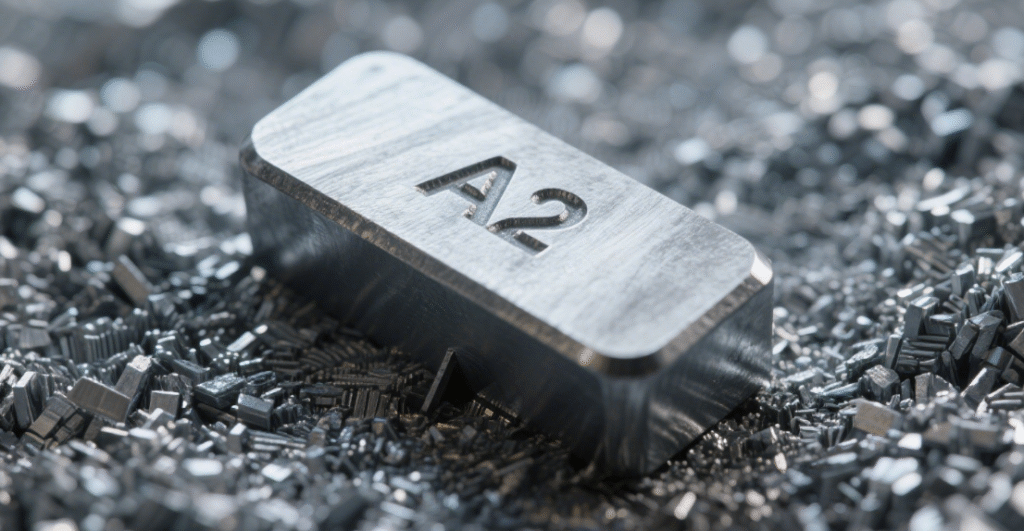Table of Contents
Introduction

In today’s industrial world, selecting the right material for precision tooling and machining is crucial for ensuring the production of high-quality, durable, and efficient parts. A2 Steel, also known as 1.2363 Steel, is a high-performance cold work tool steel that combines excellent hardness, wear resistance, and dimensional stability. Its unique properties make it ideal for applications requiring a balance between hardness and toughness. At Qilu Tool Steel Company, a subsidiary of Qilu Steel Group, we specialize in providing premium A2 Steel for a wide range of industries, ensuring high standards of quality and performance.
This article explores the properties of A2 Steel and how it improves surface finish and precision, especially in the manufacturing of high-precision tools. Whether you are designing molds, cutting tools, or stamping dies, understanding the advantages of A2 Steel is key to optimizing tool performance and longevity.
The Mechanical Properties of A2 Steel
What Makes A2 Tool Steel Unique for Precision Tools
A2 is characterized by its excellent mechanical properties, which include high tensile strength, wear resistance, and exceptional toughness. These attributes are crucial for the production of tools that require sharpness, durability, and precision.
- Tensile Strength: 670-710 MPa
- Yield Strength: 345-350 MPa
- Elongation: 41%
- Reduction Area Z: 21%
- Charpy Impact: 12 J
These mechanical properties make A2 Steel highly suitable for applications where toughness and the ability to withstand high-stress conditions are critical.
The Role of A2 Steel in Achieving Superior Surface Finish

How A2 Steel Ensures Exceptional Surface Quality
In precision machining, achieving a smooth, high-quality surface finish is essential for reducing friction, improving tool performance, and ensuring product longevity. A2 Tool Steel excels in this regard due to its fine-grain structure and the ability to maintain dimensional stability even under extreme conditions.
One of the key features of A2 is its ability to retain its surface integrity during complex machining processes, such as grinding, polishing, and cutting. This results in a smoother finish that not only enhances the appearance of the tools but also contributes to their overall performance.
Moreover, the air-hardening nature of A2 Steel allows it to maintain its hardness and sharpness, even after repeated use in high-pressure conditions, without degrading the surface finish. This makes it a popular choice for industries such as automotive, aerospace, and tool manufacturing, where both appearance and functionality are paramount.
A2 Steel’s Impact on Precision
The Role of Dimensional Stability in Tool Precision
Dimensional stability refers to a material’s ability to maintain its shape and size under varying temperature and pressure conditions. The Steel offers excellent dimensional stability, which is crucial when working with precision tooling that requires tight tolerances.
When exposed to the heat treatment process, A2 Tool Steel maintains its structural integrity, ensuring that the final tool dimensions are consistent and precise. This is especially important in the production of molds, dies, and cutting tools where even slight deviations can lead to significant quality issues and increased production costs.
By choosing A2 Steel, manufacturers can minimize the need for rework and adjustments, saving both time and resources while maintaining high-quality standards.
Applications of A2 Tool Steel in Precision Tooling

A2 Steel (1.2363) is a high-performance cold work tool steel known for its impressive combination of wear resistance, toughness, and dimensional stability. These qualities make it the material of choice in various precision tooling applications, particularly in industries that require durable, high-precision tools. Below, we explore some of the most common and critical applications of A2 Steel in precision tooling.
Die Casting Tools
In the die-casting industry, molds and dies are subjected to high pressures and extreme wear. Tools used in these processes must maintain sharpness and precision despite prolonged exposure to intense conditions. The steel’s outstanding wear resistance allows it to perform effectively under such pressures, making it a popular choice for die-casting molds and dies.
Moreover, its ability to retain shape and resist dimensional changes during repeated heating and cooling cycles ensures that the tools remain functional for extended periods. This leads to fewer replacements and reduced downtime, resulting in cost savings for manufacturers.
Stamping Dies
Stamping tools need to withstand constant impacts and repeated stress without cracking or deforming. This material excels in providing the toughness required to endure high-volume production runs. Its ability to resist cracking during repeated metal sheet formation makes it a reliable choice for stamping dies.
The hardness and toughness help maintain sharp cutting edges, which are essential for producing consistent, high-quality parts. This also reduces the need for frequent tool maintenance, ensuring smoother, uninterrupted production processes in industries such as automotive and electronics.
Blades and Punches
For cutting tools like blades and punches, it’s essential that they maintain sharpness over time, even when dealing with tough materials. The high hardness of this tool steel ensures that cutting edges retain their sharpness much longer than materials with lower hardness, reducing the frequency of sharpening and improving operational efficiency.
Additionally, its resistance to edge wear ensures consistent cutting performance, which is crucial in industries such as metalworking and manufacturing. This allows for precise and efficient cutting, minimizing downtime and improving the overall productivity of the production line.
Cold Forming Tools
Cold forming processes, such as bending, drawing, and punching, require tools that can withstand significant stress without losing their shape. This steel’s high strength at lower temperatures makes it the perfect material for cold forming tools.
These tools need to perform under heavy mechanical forces without deforming, and its resistance to wear and deformation ensures that they maintain their integrity even under continuous use. Additionally, its dimensional stability allows for the precise shaping of metal parts, which is especially valuable in high-precision manufacturing applications.
The combination of strength and stability makes it the material of choice for producing intricate and detailed components, particularly when tight tolerances are required.
Key Features of A2 Steel for Precision Applications
| Property | A2 Steel (1.2363) |
|---|---|
| Hardness | 58-62 HRC |
| Tensile Strength | 670-710 MPa |
| Yield Strength | 345-350 MPa |
| Elongation | 41% |
| Charpy Impact | 12 J |
| Application | Cutting tools, Stamping dies, Molds, Blades |
How A2 Tool Steel Improves Tool Longevity and Performance

Toughness and Durability
The toughness of A2 Steel allows tools to withstand heavy usage without cracking or breaking. This is particularly important in high-stress environments where tools are subjected to constant impact, abrasion, or heat. In industries like automotive manufacturing, aerospace, and metalworking, tools made from A2 Steel can last longer and maintain their functionality, reducing the need for frequent replacements.
Resistance to Wear and Abrasion
The wear resistance makes it an excellent material for producing tools that will be exposed to harsh conditions. Whether it’s cutting tools or dies, A2 Steel ensures that the tools retain their effectiveness over time, even under constant exposure to friction and pressure.
Conclusion
A2 Steel offers a remarkable combination of hardness, toughness, wear resistance, and dimensional stability, making it the ideal choice for high-precision tooling applications. Its ability to improve surface finish, maintain dimensional accuracy, and withstand high-stress environments ensures that tools made from A2 Steel remain durable and effective over extended periods. Whether you are producing cutting tools, stamping dies, or molds, A2 Steel is a top choice for manufacturers seeking reliable, long-lasting performance.
At Qilu Tool Steel Company, we offer A2 Steel and a wide range of other high-quality tool steels, including P20, H13, and D2, designed to meet the unique needs of your business. Our products are backed by years of industry experience and a commitment to innovation and quality. Contact us today for more information and to receive a personalized quote for your tooling needs.
FAQ
Q: What is the hardness range of A2 Tool Steel?
A: The hardness of A2 Steel typically ranges from 58 to 62 HRC, making it highly suitable for precision applications where maintaining sharpness and durability is essential.
Q: How does A2 compare to other tool steels like D2?
A: While D2 Steel offers superior wear resistance, A2 Steel is more balanced in terms of toughness and dimensional stability, making it ideal for a wider range of applications, including cold working and tool manufacturing.
Q: Can A2 Steel be used for high-temperature applications?
A: A2 Steel performs well in moderate temperature applications. For high-temperature environments, materials like H13 Steel may be a better choice, as they offer superior heat resistance.
Q: What industries benefit most from A2 Tool Steel?
A: A2 Steel is widely used in industries such as automotive, aerospace, die-casting, metalworking, and precision engineering, where durability, dimensional stability, and surface finish are critical.
For further inquiries or to get a quote on A2 Tool Steel for your next project, feel free to reach out to Qilu Tool Steel Company today!
✨ Let’s Stay Connected!

If you enjoyed this blog on mechanical parts processing, don’t forget to join me on social media for more insights, updates, and community discussions.
📘 Facebook – Connect with me here
Let’s keep exploring, learning, and growing together. Thanks for reading, and see you in the next post! 🚀

